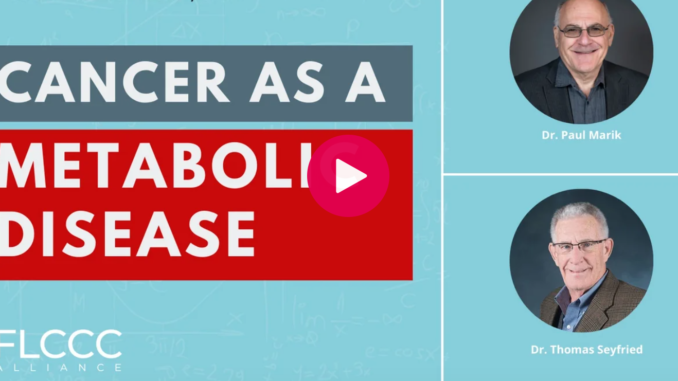By Dr. Thomas Seyfried and Paul Marik, MD, FLCC 19 July 2023
E. Rowell: Dr. Seyfried studies cancer in the lab. He describes his re-discovery of work done by Dr. Warburg, a biochemist in the period of 1930-1960, and Dr. Seyfried’s own experiments which have proved that cancer is a metabolic disease.
The current standard of care in oncology is that cancer is a disease caused by genetic mutations. Thus chemotherapy is often designed to correct these genetic mutations. Cancer chemotherapy is usually very toxic, especially to the immune system, but also to potentially all cells in the body.
What has been discovered is that any malignant tumor requires glucose and glutamine to survive. The rest of the body can survive very well without glucose and carbohydrates which are broken down to sugars. Thus if glucose and other carbohydrates are not ingested, no tumor can survive. This is true of brain tumors, colon, lung, prostate, and blood cancers as well.
The main treatment consists of a keto diet: no carbohydrates, but allowance for fats and protein. This leads to a shift in the body’s metabolism from using dietary carbohydrates for energy to using the body’s fat stores for energy. While this occurs, the tumor is deprived of what it needs to survive.
Glutamine, an amino acid is also required by cancers, and here the treatment is a more delicate balance as described by Dr. Seyfried. But medications that make glutamine less available to tumors can be used in a pulse-like fashion.
Some medications have also been found extremely helpful such as mebendazole.
Some people use the keto diet along with their chemotherapy. In many cases people have found their chemotherapy side effects are much reduced, and all have found their tumor much more responsive to the chemotherapy. Sometimes a lower dose of chemotherapy can be used as a result.
All cells in the body produce energy in the mitochondria. There are multiple biochemical pathways by which energy can be produced. If you would like a brief primer on how the body produces energy you can view it here:
Since doctors have been trained in the cancer as genetic mutation paradigm, it is often difficult to find a doctor who understands the biochemistry details and it is also difficult for doctors to choose treatments that are outside of the standard approach. That is why Dr. Marik and others are trying to educate people and doctors.
Dr. Marik believes a change in cancer treatment will probably be a patient driven change.





https://youtu.be/nifUBDgPhl4?si=omNUWO7lGZAdzWU-
https://en.wikipedia.org/wiki/Schweigt_stille,_plaudert_nicht,_BWV_211
Been following Dr. Seyfried for some time now. Is research is quite interesting. Hopefully the medical establishment will look into it. About ten years ago, I watched the reaction of a Cancer doctor when my friend refused the cancer protocol he was pushing. He could not hide his emotions, he let his anger seep out. I knew then current cancer research was not the train I would ever take a ride on.